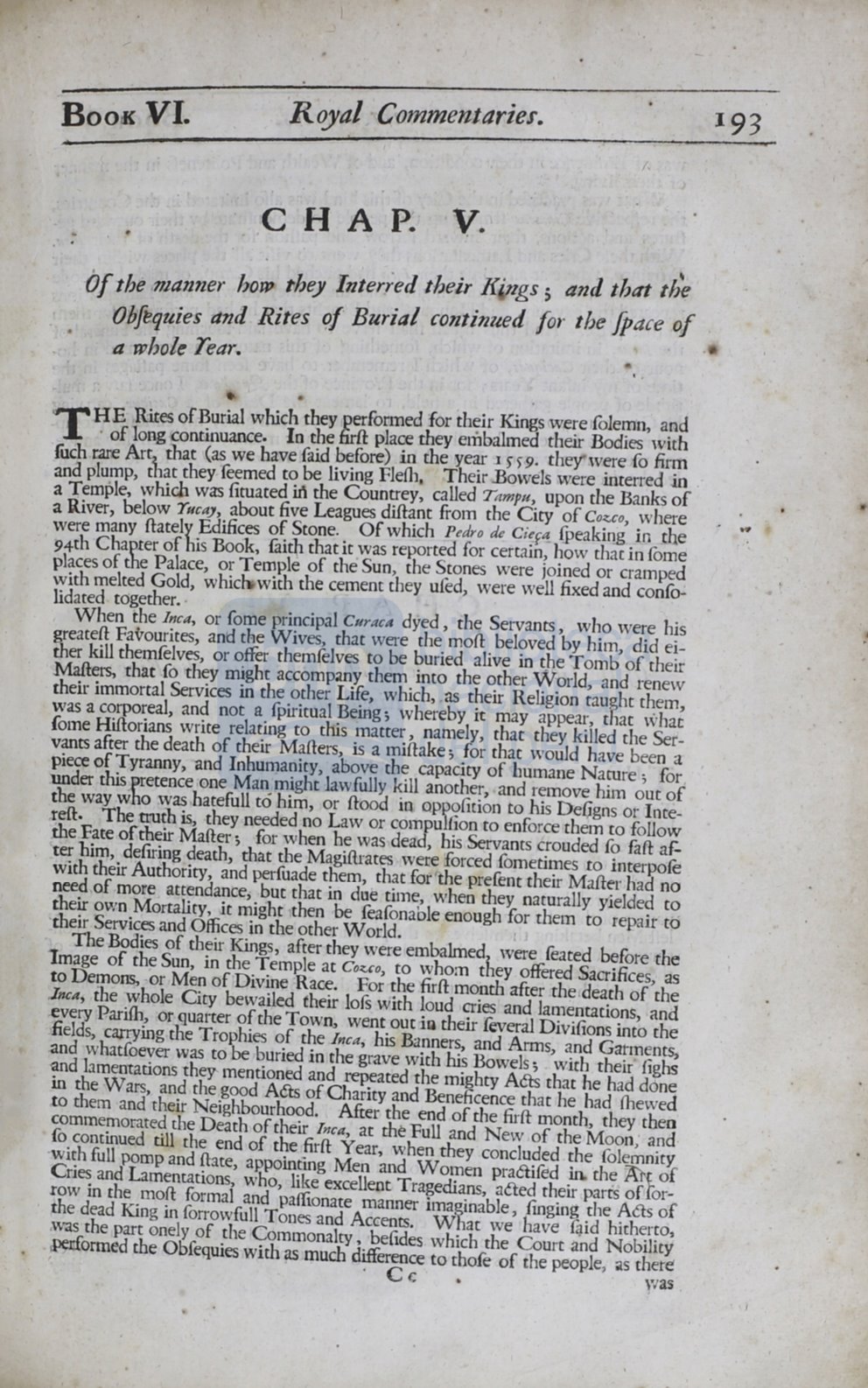

BooK
VI.
'Royal
Commentaries.
I
C HA P:
V.
Of
the
11ia11ner
how
they
Interred
their /Cngs;
and that
tlie
Obfequies
and
Rites of Burial continued for the JPace
of
a whole
Tear.
' .
T
HE
.Rites of
Burial which they performed for
th~r
Kings
we~e
foleI?n,
a.ad· of loag
continuance.
In the
firfi
place
they embalmed their Bodies
withfuch rare
Ar~
tbat (as we have faid before) in the year
.x ) )
9.
they were
fo
furn
and
plump, that they feemed
t~
be living Flelh. Their .Bowels were interred
in
a
Temple,
which was
fituated
m
the Count:rey, called
Tampu,_
upon the Banks of
a
lliver below
Tucay,
about five Leagues dillant
from
the
City
of
Co~co,
where
were m'any ftately Edifices of Stone.
Of
which
Pedro
de
Ciefa
[peaking
in
the
9 4
th Chapter of his Book, faith that it was reported for certain, how that in fome
places of the Palace, or
Te~2le
of the Sun, the Stones were joined or
crampe~
with melted Gold, whic with
the
cement they ufed, were
well
fixed and confo–
lidated wgether.
1
93
When the
Inca,
or fome principal
Curaca
dyed , the Servants, who were
his
greatefi Favourites, anti the Wives, that were the.
moil:.
bel~wed
by him,
did
e~ther kill themfelves, or offer themfelves to be buned alive
m
tpe
Tomb of their
Mafters,
that
fo
they might accompany them into the other World, and renew
their immortal Services
in
the other
Life,
which,
as
their Religion
taught
them,
was a
corporeal, and not
a
fpiritual Being; whereby
it
may appear, that what:
fome Hiftorians write relating to chis matter, namely, that diey
killed
the
Ser–
vants
after the death of their Mafiers,
is
a
mifi:ake; for that would have been
a
piece of Tyranny, and Inhumanity, above the capacity of humane Nature; for . '
under
this
~retence
one
Man
might lawfully
kill
another, and remove him out of
·
the
way who
was
hatefull
to
fuirn,
or ftood
iti
oppgfition to his De{jgns
or
Inte–
reft. The
truth
is,
they needed no Law or compulfion to enforce them to follow
the
Fare oftbeir Mafi:er;
for
when he
was
dead,
his
Servants crouded
fo
faft
af–
ter bim, defiring death, that the Magiftrates wete forced fometimes to interpofe
with
their
Authority, and perfuade diem, that for 'the prefent their Mafier had no
need of more attendance, but that in due time, when they naturally yielded co
their own Mortality, lt might then
be
feafonable enough for them
to
repair
to
their Services and
Offices
in the other
W
odd.
·
The Bodies of their Kings, after they were embalmed, were feated before the
Image of the Sun, in the Temple at
Co~,o,
to whom they offered Sacrifices,
as
to Demons, or Men of Divine -Race.
For the
full:
month after the death of
rhe
.Inca,
ihe whole
City
bewailed their lofs with loud cries and lamentations, and
.every
Par.llh,
or quarter of the Town., went out
io
their feveral Divifions into che
fields,
carrying
tlie Trophies of the
Inca,
his
Banners, and
Arms,
and Gatments,
and
whatfoever
was
to be buried
in
the grave with his Bowels; with their fighs
~nd
lamentations they- mentioned and repeated the
mighty
AC:ts that he
had
done
m
the Wars, and the good A& of Charity and Beneficence that he had !hewed
to them and their Neighbourhood. After the end of the
firfi:
month they then
commemorated the Death of their
Inca,
at
the
Full and New of the Moon
and
fo_
continued
till
the end of the
full:
Year, when they concluded the
fole~nity
w1~h
full
pomp and
~ate,
appointing Men and Women praetifed
in.
the
IDt
of
Cn~
and Lamentauons, who, like excellent Tragedians, aCl:ed their parts of ior–
row
10
the .
mo~
formal and paffionate manner imaginable,
f
mging the
Atts
of
· the
dead
King m
forrowfull
Tones
and
Accents.
What
we have
faid
hitherto,
was
the part onely of the Commonalty, beGdes which the Court and Nobility
.penformed the Obfequies
with
as much
difference to
thofe
of
the people, as
there
· C c
..
y1as
••
f














